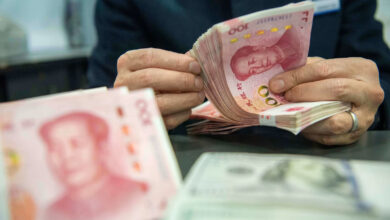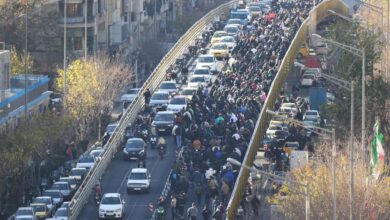
The Egyptian pound has continued to lose value against the US dollar in the last few months, with black market deals reported at LE13.40 in early September, the worst ever dollar exchange rate for the Egyptian currency. Even the official rate at banks has reached unprecedented levels, standing at LE8.9 per dollar.
The continued slide, resulting largely from a lack of US dollars in the economy in recent years, has prompted the Central Bank of Egypt (CBE) to take several corrective measures, most notably the closure of many exchange bureaus accused of hoarding dollars.
There has also been talk of a further official devaluation of the pound, likely involving at least a partial floatation of the currency. Some degree of floatation would be in line with the conditions set by the International Monetary Fund (IMF) for a large dollar loan promised to Egypt. This condition is one of several that have been publicly announced, along with the introduction of Value Added Tax (VAT), subsidy reforms and cuts in other areas of government spending, such as staffing levels.
As of early September, Egyptian media outlets reported rumors of a possible floatation before the October 6 national holiday. However, the expected move did not occur, with government sources asserting that any devaluation would have to wait until subsidy measures had been taken to control a possible surge in the cost of household goods, particularly food.
Among those predicting an imminent devaluation was Beltone Financial, which released a report on September 2 saying that the CBE would float the national currency within a few hours, the third such warning within the space of a week.
Beltone alleged that the recent meeting with President Abdel Fattah al-Sisi and Central Bank Governor Tarek Amer on Saturday indicated political support and a final decision from Sisi. Belton said that the CBE would devalue the pound to LE11.5 and LE12.5 against the dollar within a couple of days.
“It’s optimal to ensure success in securing funding from the IMF and Eurobond market, as well as meet the president's pledge to stabilize the FX market by December 2016,” the report read.
Beltone’s prediction proved premature, but the general consensus is that there will soon be a further devaluation, possibly based on a partial floatation system.
Where opinion differs, though, is on the likely outcome of floatation. While some say it is an essential move to bring the currency crisis under control and secure more foreign currency, others say it will be a disaster, leading to massive price hikes and further discontent among ordinary people.
Devaluation options
According to economist Abdul Khalik Farouk, a full floatation would see the national currency dependent on the supply-and-demand conditions in the local market, without the intervention of the monetary authorities, which are headed by the CBE.
Rashad Abdou, head of the Egyptian Economic Forum, said, “The Egyptian government continually intervenes in setting the currency's value, which is a system called the ‘free exchange orbit'. But if the CBE relinquished its responsibility, a 'free exchange' system would be adopted.”
One alternative would be a “managed float” regime, by which the exchange rates fluctuate from day to day, but the central bank attempts to influence exchange rates by buying and selling currencies.
As far back as March, CBE official Mohamed al-Erian warned against floating the Egyptian currency except in coincidence with "decisive economic decisions". Such decisions could include adjusting imports based on priority, disconnecting the Egyptian pound from the dollar, basing it instead on a basket of currencies, and raising interest rates on Egyptian pounds to avoid “dollarization”.
In late August, a senior government official revealed that the IMF was asking Egypt to fully float the Egyptian currency, as part of negotiations over a planned US$12 billion loan over three years. However, the official said that the government had rejected the proposal in favor of devaluing of the pound by 20 percent to a value of LE10.
More recently, Trade and Industry Minister Tareq Qabil said during the Euromoney conference in Cairo that the government is considering a “fluctuating exchange rate” for the pound, which means full floatation. However, a source within the CBE said that the decision would be made by the CBE, not by the government.
Whether the CBE goes for full floatation or seeks to maintain some degree of control, a change of some sort now seems inevitable.
Price increases
Economist, Sharif Dalwar, said there are two reasons why the government would want to float the pound. Firstly, floatation could help boost foreign reserves in the banks. Secondly, it could bring exchange rates under control, aligning the official rate with the black-market rate.
But many fear there could be negative consequences of such a move, with price increases among the key concerns.
According to Farouk, “If the Egyptian pound is floated it will weigh badly on the prices of imported goods, or those that are available in the market now.”
Dolwar, meanwhile, believes that further devaluation would mean imposing additional economic pressure on the Egyptian population.
“The structure of Egyptian industry depends heavily on foreign inputs and domestic trade depends on the foreign inputs as well," Dolwar said.
He explained that investors usually deal with the black market, not the official banks, due to the lack of dollars available from banks under current restrictions.
The fear of price increases is reflected in the government’s announcement last week that no devaluation would take place until measures had been taken to shore up prices of essential goods. New subsidy levels for key foodstuffs were promised and steps taken to secure stocks of essentials in the domestic market.
On Tuesday, Prime Minister Sherif Ismail said that the government was aiming to import 500,000 tonnes of rice and 400,000 tonnes of sugar with a view to containing prices and boosting reserves. The government aims to build up a six-month reserve of essential foodstuffs, with recent large purchases of oil and wheat part of the same effort.
According to the Central Agency of Public Mobilization and Statistics, the inflation rate in June jumped to 14.8 percent due to the high prices of food and garments. Massive inflation has been an ongoing cause for concern among government officials, the business community, economists and the general public.
Due to the large number of Egyptians living on the poverty line, the government fears that steep increases in food prices or a scarcity of essentials could lead to mounting discontent and even public unrest.
Pending disaster?
Economist Madgy Toulba is more direct than some in expressing his concerns over a possible floatation.
“It’s a disaster, and the decision will have a devastating impact on the domestic market,” he said.
He says that floating the national currency means exposing it to supply and demand, but since there is no demand for the Egyptian pound at present, it will plunge in value as a result.
Toulba explains that the sectors that are Egypt’s main source of the foreign reserves have been suffering since the uprising of January 2011, and they have not yet been healed, including tourism and investments.
"The government is implementing the IMF conditions very well," he said
“Sometimes floating the currency can be good, if the country already has a rich store of foreign currency. But the country’s only source of foreign reserves at the moment is foreign loans, grants and deposits, which are not a solid basis for this decision,” he said.
Toulba said that floating the Egyptian currency could raise consumer prices by 30 percent, especially since 75 percent of products are imported.
“Moreover, a large part of the components of local products and industries are imported materials, meanings that the prices of local products like vegetables and fruits will surge,” he said.
Toulba believes that floating the currency will hurt ordinary Egyptian citizens, and the government should consider alternative methods of fixing the currency crisis.
"No official decision has been declared yet,” he said. “But since the CBE recently announced that it will not intervene any more in managing the exchange rate of the national currency, floatation is already happening.”




